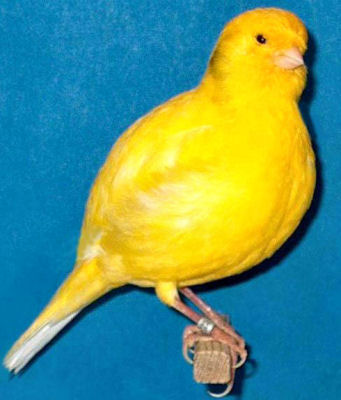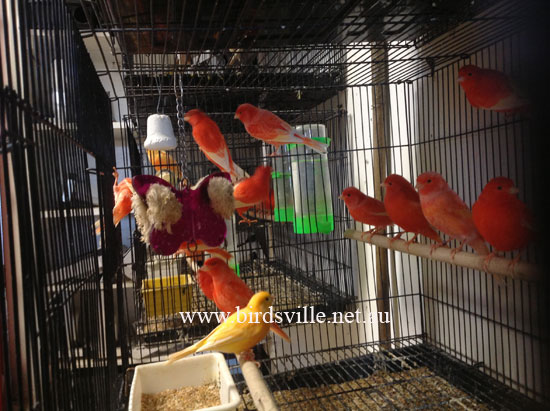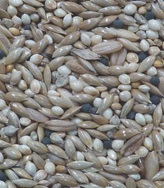Canary Care Sheet
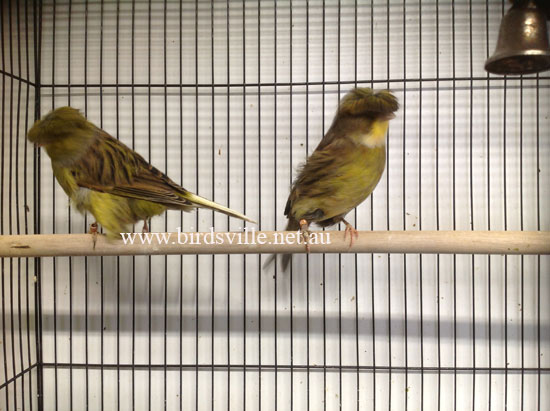
Bringing a canary home for the first time
- Leave the canary in cage somewhere quiet to get used to the new surroundings
- Add sulphadim or sulfa 3 to the water for the first 5 days this is a mild antibiotic and is simply a preventative to stop your bird from getting diarrhea due to the stress of moving to a new environment.
- Worm your bird 2 weeks after bringing home, never worm a bird to soon after being moved, worming is easily administered via the water supply, inside birds should be wormed every 6 months and outside birds every 3 months.
- Spray your birds with mite and lice spray every 3 months if your bird is inside or outside.
Is my Canary Healthy and what to look for
do not purchase a bird which has red swollen eyes, dirty or runny stools, not active, puffed up or sitting low to the ground. Just because a canary appears to be eating a lot does not mean your bird is healthy as sick birds will pretend to eat.
Diarrhea is one of the biggest issues with canaries and all small birds and can quickly kill a bird this can happen with stress or a change of diet
If your canary has these signs purchase a broad spectrum antibiotic from your local avian specialist and keep your bird warm, broad spectrum antibiotics is a great first line of defense if the antibiotic does improve the health of the bird see a bird vet.
Signs of a healthy canary
- Active
- Alert
- Sociable
- Dry clean vent
Diet for Canaries
A diet of only seed makes your canary deficient in over 30 vitamins and minerals
Seed– The most important thing you can do is feed your bird a good quality freshly milled seed mix. Be wary of some supermarket mixes as they may not be of the highest grade and have less of the important seeds essential for optimum health of canaries and have filler seed which is wasted. aOther seeds relished by canaries are hulled oats, niger, plain canary
For encouraging whistling feed your canary a tonic mix.
For breeding feed your canaries hulled oats and some niger during winter and in summer mostly plain canary.
Sprouted seed and legumes– Alfalfa, buck wheat, mung beans, red kidney beans, sesame seed.
Greens and veg– Bok-choy, cabbage leaves, cauliflower leaves, spinach, collared greens, dandelion leaves, kelp, mustard leaves, water crest, seeding grasses, silver beet, seeding grasses, chickweed and cucumber, broccoli, carrots and carrot tops, beans, peas, parsnip, squash, sweet potato.
Fruit– star fruit, apple, pear, berries, melon, citrus, stone fruit, kiwi fruit, mango, banana.
Crumble– We have found out of all of the pellets available the best suited for canaries is Vetafarm Finch and budgie crumble, this has vitamins added so it is one of the few products where these birds can properly ingest vitamins without adding to the water.
Vitamin Supplement– Added via the water supply an important supplement for canaries especially when moulting.
Egg and biscuit formula– A valuable source of protein for canaries and essential for Canaries used by all canary breeders.
Fresh water– have available at all times as canaries eat and drink alot, do not allow water to become dirty. Water bottles are great as they are very difficult for canaries to soil and they last a long time as they can not bath in them which can kill a canary on a hot day if they splash all the water out.
Grit mix– Use a good quality fine grit which contains baked egg shell, crushed cuttlebone, shell, and limestone. Other alternatives slightly less effective but it does get the job done is using cuttle bone, calcium bells. Never place grit mix in the same dish as the seed.
Vitamin D– Used by indoor breeders for a reason, canaries can not absorb calcium mentioned above with out vitamin D just like humans. Birds naturally absorb vitamin D through the sun but this must be unfiltered sun light so if your bird is inside and only getting sun through a window and unable to get natural unfiltered sunlight you should add a vitamin D supplement Via the water supply.
Iodine– have an iodine bell or perch supplied at all times as many canaries are iodine deficient.
Do not feed Canaries– Chocolate, onion, avocado or lettuce.
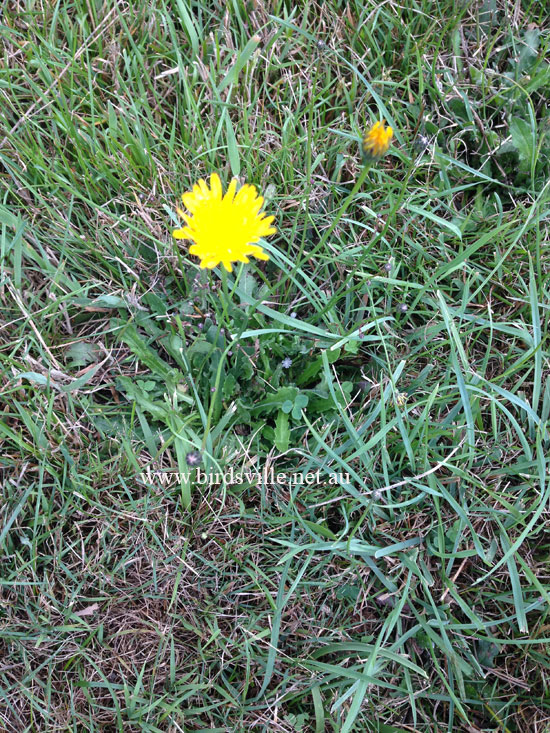
Housing Canaries
- Cage selection– Tiny cages are not recommended as they are active birds and will be much happier in a cage big enouph for them to move around. we recommend a cage size of 18 inches by 14 inches as a minimim. Some larger cages for canaries are great too
- position of cage in home– Do not leave the cage in a drafty place especially in winter as this can easily chill a canary to the bone and make them sick.
- perches– have a variety of perches of different sizes
- swings– Important to have swings not only for enrichment but is a great form of exercise
- Toys– use small toys with bells and bits for them to pick at.
- Housing canaries together or with other birds– Do not house male canaries together as they fight, females get along very well with male or female. Canaries do get along well with finches.
- Habitat maintenance– clean regularly and do not let droppings build up on perches. Replace worn out feeders and perches.
- Bird bath’s– Essential for canaries as they love to keep clean, always make sure bathing water is clean.
for more detailed information Canaries visit our canary pages
